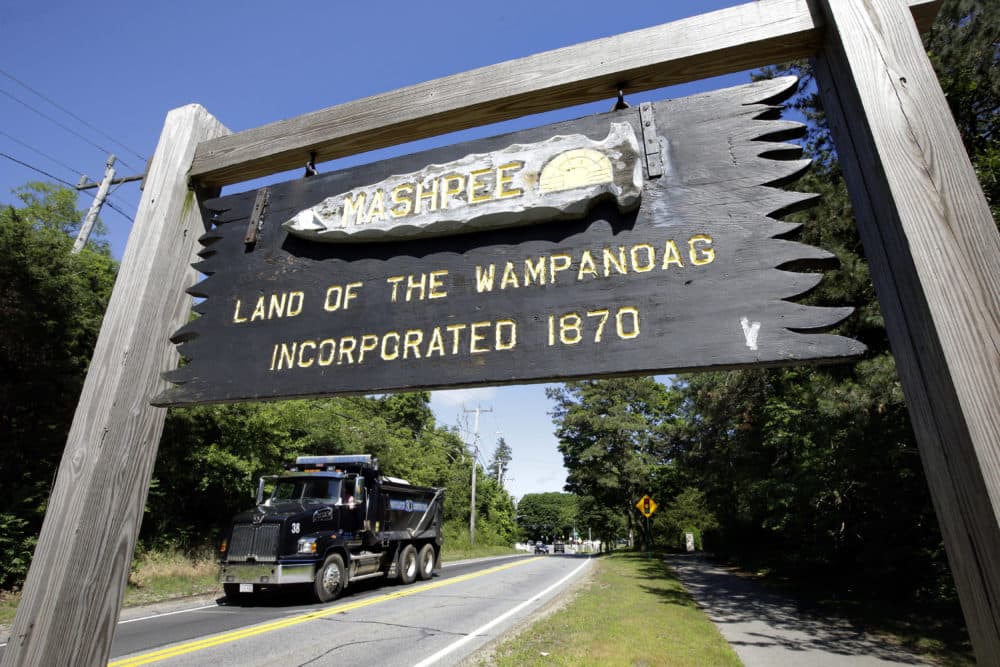Advertisement
Judge Orders Trump to Reconsider Ruling Revoking Mashpee Wampanoag Reservation Status

A federal judge ruled late Friday in favor of the Mashpee Wampanoag tribe in its circuitous quest to maintain control of 321 acres of reservation land in Mashpee and Taunton, saying the Trump administration's 2018 declaration that the tribe does not qualify as "Indian" under the federal Indian Reorganization Act was "arbitrary, capricious, an abuse of discretion, and contrary to law."
U.S. District Judge Paul Friedman granted the tribe's motion for summary judgment in the U.S. District Court for the District of Columbia case — Mashpee Wampanoag Tribe v. Interior Secretary David Bernhardt — in which the tribe argued that the interior secretary failed to properly consider extensive factual evidence it submitted to make the case that it should be eligible for land in trust. The judge remanded the matter to the Department of the Interior for the agency to reconsider.
In a statement, Tribal Council Chairman Cedric Cromwell said Friedman "righted what would have been a terrible and historic injustice."
"While we are pleased with the court's findings, our work is not done. The Department of Interior must now draft a positive decision for our land as instructed by Judge Friedman. We will continue to work with the Department of the Interior — and fight them if necessary — to ensure our land remains in trust," the chairman said.
The tribe's land in trust status has been under contention for years. The tribe was federally-recognized in 2007 and the Obama administration took the land into trust for the tribe in early 2016. But the Trump administration has worked to undo that designation at the same time that the tribe has worked to build a $1 billion casino on its land in Taunton.
Sen. Marc Pacheco, who lives in and represents the city where the Wampanoag tribe hopes to build its casino, said he was pleased with Friedman's ruling.
"Throughout the course of this dispute, the tribe has consistently argued that the Department of the Interior failed to apply the correct standards in deciding to invalidate the tribe's land-in-trust — this new ruling certainly seems to validate that argument," he said. "The Court's recent decision will hopefully prevent the shameful injustice of taking land from the tribe that greeted the Pilgrims as we celebrate the 400th anniversary of their arrival here in the Commonwealth."
In March, Bernhardt ordered the tribe's land be taken out of trust status, putting the sovereignty of the tribe's 321 acres of reservation land in Mashpee and Taunton in question. The tribe is appealing another case challenging its land in trust status, Littlefield et al. v. U.S. Department of the Interior, at the U.S. Court of Appeals for the First Circuit.
In addition to the tribe trying to secure its land in trust through the courts, U.S. Rep. William Keating has pushed federal legislation that would use the power of Congress to reaffirm the 2015 decision by the Interior Department to take land into trust for the tribe, though President Donald Trump has opposed it.
In a statement Saturday, Keating said the judge's ruling was a victory for the tribe and a repudiation of the Trump administration's "policy designed to punish the Mashpee Wampanoag."
"Judge Freidman described the actions of the Administration with regard to the Mashpee Wampanoag Tribe as arbitrary and capricious. I think that rightly describes the Administration's actions to remove the Tribe's land from trust during the most serious public health emergency of our lifetime – actions that defy reason and basic decency," Keating said. "I applaud Judge Friedman's decision, but given that it remands the issue back to the Department of the Interior, we must now remain vigilant to ensure that the Trump Administration does not continue with the flagrant pattern of disregard for tribal rights."
The U.S. House of Representatives voted 275-146 in May 2019 to approve that bill, titled the Mashpee Wampanoag Tribe Reservation Reaffirmation Act, and it has not moved since being referred to the U.S. Senate that same month.
The fate of the tribe's land in trust could also have a significant impact on the state's commercial casino industry. The Mass. Gaming Commission could still issue a license for a commercial casino in Region C — the commission's name for Bristol, Plymouth, Barnstable, Dukes and Nantucket counties — but some worry that commercial casino operators might not be willing to invest the minimum $500 million in a project that would have to compete with a nearby tribal casino.
Plus, if the Gaming Commission opts to go ahead with licensing a commercial casino in Region C and the tribe is allowed to open its own casino under federal law, Massachusetts would receive no tax revenue from the tribal casino.
Speaking to the Gaming Commission in October, Pacheco advocated for gathering as much information as possible before regulators make any decision on Region C and suggested that any "definitive" ruling from the administration this year could be changed based on the outcome of November's presidential election.
This article was originally published on June 06, 2020.